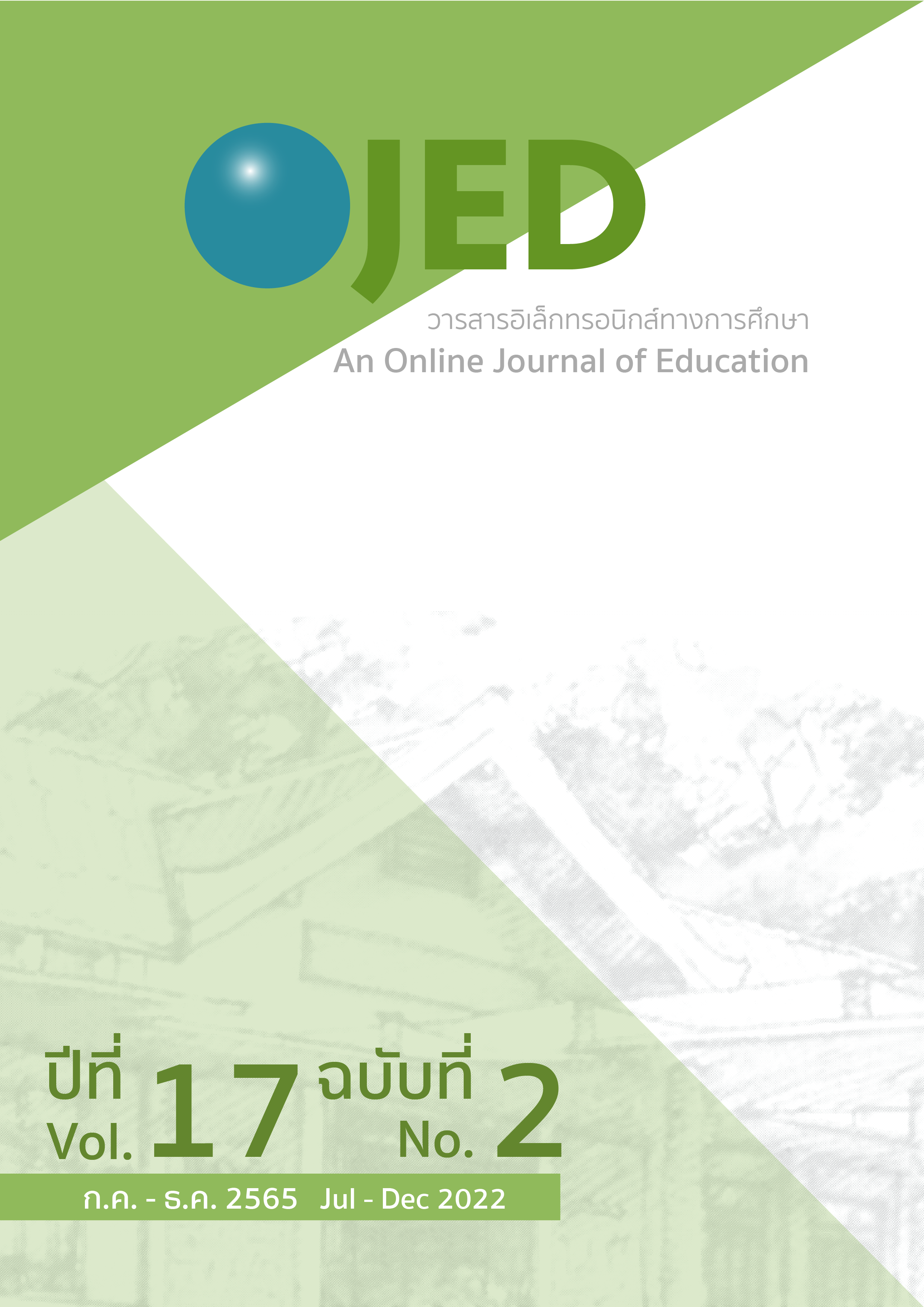Development of Mathematical Activity Package by Using Mathematization to Enhance Mathematical Connection Ability of Tenth Grade Students
DOI:
https://doi.org/10.14456/ojed.2022.47Keywords:
mathematical package, mathematization, mathematical connection abilityAbstract
The purposes of this research were 1) to develop a mathematical activity package using mathematization, 2) to compare the mathematical connection ability of students after learning with this package to the criteria of 65%, 3) to compare the mathematical connection ability of the students before and after learning from the activity package, and 4) to study the development of the mathematical connection ability of students learning from the activity package. The subjects were 32 tenth grade students in Suphanburi. The instruments used for data collection included four mathematical connection ability tests; and a mathematical activity package using mathematization. The data were analyzed using arithmetic mean, standard deviation, t-test, and content analysis. The results of the study revealed that 1) the development of the mathematical activity package using mathematization was of good quality, 2) the mathematical connection ability of the students after being taught using the mathematical activity package was higher than the criteria of 65% at the .05 level of significance, 3) the mathematical connection ability of the students after being taught using the mathematical activity package was higher than before being taught at the .05 level of significance, and 4) the mathematical connection ability components were changed in a positive direction in term of explaining solutions, identifying mathematical knowledge, and identifying examples close to the original problem.
References
กระทรวงศึกษาธิการ. (2545). สาระและมาตรฐานการเรียนรู้กลุ่มสาระการเรียนรู้คณิตศาสตร์. โรงพิมพ์ครุสภาลาดพร้าว.
เกศินี เพ็ชรรุ่ง. (2556). การพัฒนาชุดกิจกรรมการเรียนรู้ตามแนวการศึกษาคณิตศาสตร์ที่สอดคล้องกับชีวิตจริงเพื่อส่งเสริมมโนทัศน์และความสามารถในการเชื่อมโยงความรู้คณิตศาสตร์ [วิทยานิพนธ์ปริญญามหาบัณฑิต ไม่ได้ตีพิมพ์]. จุฬาลงกรณ์มหาวิทยาลัย
จิรรัตน์ จตุรานนท์. (2554). การศึกษาความรู้ทางคณิตศาสตร์ ทักษะและกระบวนการทางคณิตศาสตร์ และความคิดเห็นเกี่ยวกับการเรียนการสอนของนิสิตนักศึกษาครุศาสตร์ ศึกษาศาสตร์ วิชาเอกคณิตศาสตร์ [วิทยานิพนธ์ปริญญามหาบัณฑิต ไม่ได้ตีพิมพ์]. จุฬาลงกรณ์มหาวิทยาลัย.
ซูรายา สัสดีวงค์. (2555). การพัฒนากระบวนการจัดการเรียนรู้โดยบูรณาการรูปแบบการพัฒนาความคิดทางคณิตศาสตร์และแนวคิดการใช้ปัญหาเป็นหลักเพื่อส่งเสริมความสามารถในการคิดวิเคราะห์และความสามารถในการแก้ปัญหาทางคณิตศาสตร์ ของนักเรียนชั้นมัธยมศึกษาปีที่ 2 [วิทยานิพนธ์ปริญญามหาบัณฑิต ไม่ได้ตีพิมพ์]. จุฬาลงกรณ์มหาวิทยาลัย.
พลฐวัตร ฉิมทอง. (2563). ผลของการจัดกิจกรรมการเรียนรู้คณิตศาสตร์โดยใช้ตัวอย่างงานที่มีต่อความรู้ทางคณิตศาสตร์และความสามารถในการสื่อสารทางคณิตศาสตร์ของนักเรียนมัธยมศึกษาปีที่ 3 [วิทยานิพนธ์ปริญญามหาบัณฑิต ไม่ได้ตีพิมพ์]. จุฬาลงกรณ์มหาวิทยาลัย.
เวชฤทธิ์ อังกนะภัทรขจร. (2551). การพัฒนากิจกรรมการเรียนรู้แบบการสอนแนะให้รู้คิด (CGI) ที่ใช้ทักษะการให้เหตุผลและการเชื่อมโยงโดยบูรณาการสาระการเรียนรู้คณิตศาสตร์ เรื่อง การวิเคราะห์ข้อมูลกับสิ่งแวดล้อมศึกษา สำหรับนักเรียนชั้นประถมศึกษาปีที่ 6 [วิทยานิพนธ์ปริญญาดุษฎีบัณฑิต ไม่ได้ตีพิมพ์]. มหาวิทยาลัยศรีนครินทรวิโรฒ.
สกล ตั้งเก้าสกุล. (2560). การพัฒนาชุดกิจกรรมทางคณิตศาสตร์ตามแนวคิดการใช้บริบทเป็นฐานร่วมกับการสร้างแบบจำลองทางคณิตศาสตร์ เพื่อส่งเสริมความสามารถในการเชื่อมโยงความรู้คณิตศาสตร์ และเจตคติต่อวิชาคณิตศาสตร์ของนักเรียนมัธยมศึกษาปีที่ 3 [วิทยานิพนธ์ปริญญามหาบัณฑิต ไม่ได้ตีพิมพ์]. จุฬาลงกรณ์มหาวิทยาลัย
สถาบันส่งเสริมการสอนวิทยาศาสตร์และเทคโนโลยี. (2550). ทักษะกระบวนการทางคณิตศาสตร์. สถาบันส่งเสริมการสอนวิทยาศาสตร์และเทคโนโลยี กระทรวงศึกษาธิการ.
สถาบันส่งเสริมการสอนวิทยาศาสตร์และเทคโนโลยี. (2555). ทักษะกระบวนการทางคณิตศาสตร์ (พิมพ์ครั้งที่ 3). 3-คิว มีเดีย.
สถาบันส่งเสริมการสอนวิทยาศาสตร์และเทคโนโลยี. (2560). ตัวชี้วัดและสาระการเรียนรู้แกนกลาง กลุ่มสาระการเรียนรู้คณิตศาสตร์ (ฉบับปรับปรุง พ.ศ.2560) ตามหลักสูตรแกนกลางการศึกษาขั้นพื้นฐาน พุทธศักราช 2551.
สำนักวิชาการและมาตรฐานการศึกษา. (2551). รายงานการสังเคราะห์แนวคิดและวิธีจัดการเรียนการสอนที่ส่งเสริมทักษะการคิดวิเคราะห์ กลุ่มสาระการเรียนรู้คณิตศาสตร์. โรงพิมพ์ชุมชนสหกรณ์การเกษตรแห่งประเทศไทย.
สิริพร ทิพย์คง. (2551). เป้าหมายของการเรียนคณิตศาสตร์. วารสารคณิตศาสตร์, 53(599-601), 12-19.
อัมพร ม้าคนอง. (2553). ทักษะและกระบวนการทางคณิตศาสตร์: การพัฒนาเพื่อพัฒนาการ. โรงพิมพ์แห่งจุฬาลงกรณ์มหาวิทยาลัย.
อารีย์ ศรีเดือน. (2547). การพัฒนาชุดกิจกรรมคณิตศาสตร์แบบปฏิบัติการ เรื่องการประยุกต์ 1 เพื่อส่งเสริมความสามารถในการคิดอย่างมีเหตุผล [วิทยานิพนธ์ปริญญามหาบัณฑิต ไม่ได้ตีพิมพ์]. มหาวิทยาลัยศรีนคริทรวิโรฒ.
Aufa M., Saragih S., & Minarni, A. (2016). Development of learning devices through problem based learning model based on the context of Aceh cultural to improve Mathematical communication skills and social skills of SMPN 1 Muara Batu students. Journal of Education and Practice, 17, 232-248.
Blum, W., & Ferri, R. B. (2009) Mathematical modelling: Can it be taught and learnt?. Journal of Mathematical Modelling and Application, 1(1), 45-58.
De Lange, J. (1996). Using and applying Mathematics in education. In A. J. Bishop et al., (Eds.), International Handbook of Mathematics Educations. Kluwer.
Donald, R., Kerr Jr., & Daniel, M. (1993). Mathematical model to provide application in the classroom. Application in School Mathematics. NCTM.
Fauzan, A., Slettenhaar, D., & Plomp, T. (2002). Traditional Mathematics education vs realistic Mathematics education: Hoping for changes. http://citeseerx.ist.psu.edu/viewdoc/download?doi=10.1.1.470.6981&rep=rep1&type=pdf
Good, C. V. (1973). Directrionary of education. McGraw-Hill.
Illinois Mathematics and Science Academy (IMSA). (2008). Problem-based learning matters. http://www.pbln.imsa.edu/resources/PBL_Matters.pdf
National Council of Teachers of Mathematics (NCTM). (2000). Principle and standards for school Mathematics (vol. 1). National Council of Teachers of Mathematics.
Organization for Economic Co-operation and Development (OECD). (2009). PISA 2009 assessment framework-key competencies in reading. Mathematics and Science.
Downloads
Published
How to Cite
Issue
Section
License
Copyright (c) 2022 An Online Journal of Education

This work is licensed under a Creative Commons Attribution-NonCommercial-NoDerivatives 4.0 International License.




